How Edinburgh helped pave the way for new society after Second World War
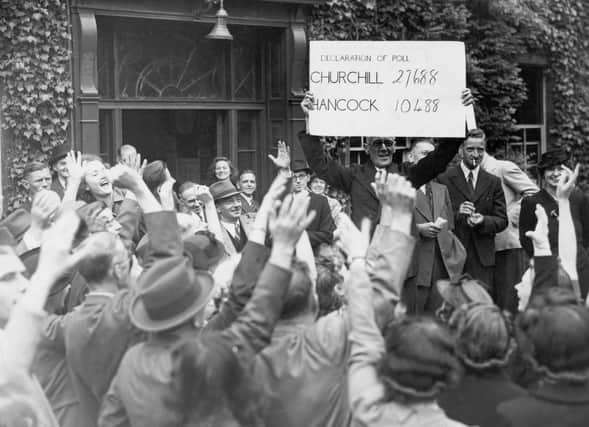

LESS than two months after VE day, voters across Britain went to the polls to choose who should take charge of rebuilding the country in the wake of the Second World War.
Many expected the 1945 general election to confirm Winston Churchill as prime minister at the head of a Conservative administration.
Advertisement
Hide AdAdvertisement
Hide AdBut instead Labour swept into power under Clement Attlee, winning previously safe Tory seats and ending up with nearly 400 of the 640 MPs.
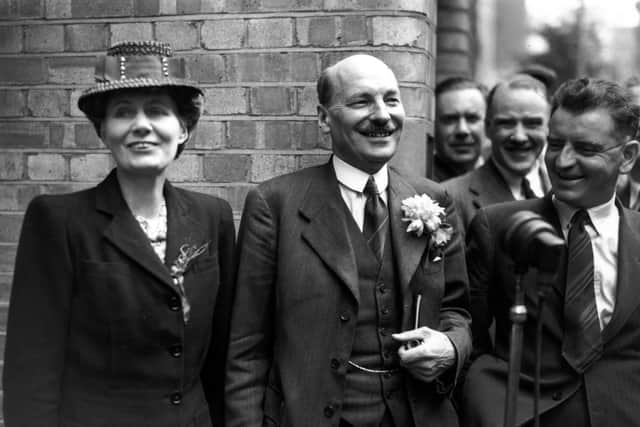

In Edinburgh, Labour already held one of the city’s six seats and won three more, but the other two still elected Unionist MPs, as the Tories were then known in Scotland, one of them being Alistair Darling’s great uncle, Sir William Darling.
He later wrote on Churchill’s defeat: “Some of us felt it was rather shaming that the people of Britain had turned against the man who had brought them to victory, who at one time in the war was indeed the only asset that Britain possessed.
"Somehow the people had been persuaded that a country which had been all but battered to death was a country possessing the resources, wealth and capacity to risk the changing of its economic life and the conferring of vast benefits on all from some source of which none of us knew the location."
Advertisement
Hide AdAdvertisement
Hide AdBut Labour's victory marked a sea change in British politics, paving the way for the creation of the National Health Service, the welfare state, nationalisation of the coal mines, railways, gas and electricity and establishing a post-war consensus which lasted until the 1980s.
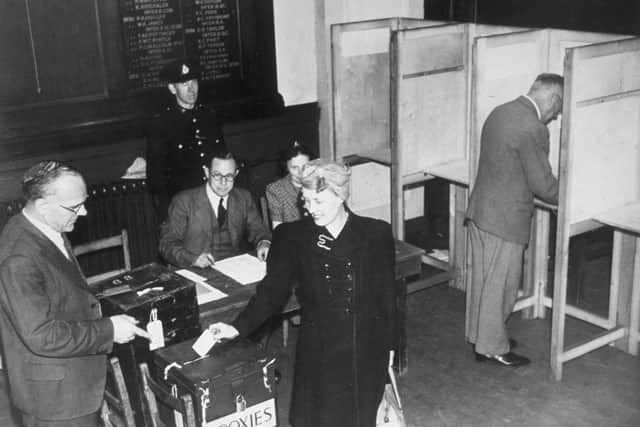

The experience of the war years had shown the benefits of state mobilisation of resources, undermined class distinctions and fostered a sense of community.
Voters in 1945 associated the Tories with the bad old days of the 1930s and didn't want to go back to that.
Polling day for most of the country was July 5, but because of local trades holidays, voting in Edinburgh and a few other places was postponed a week until July 12, or in some cases even later.
Advertisement
Hide AdAdvertisement
Hide AdAnd to allow for ballot papers to be gathered in from service personnel abroad, the votes were not counted until July 26.
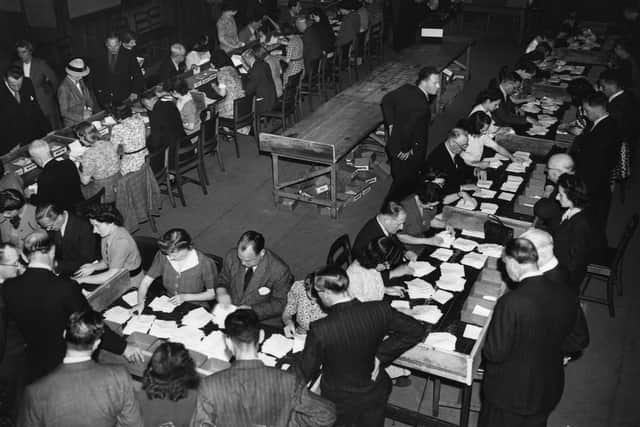

Because of the war, women outnumbered men by some margin. In Edinburgh there were a total of 170,162 women on the electoral roll compared with 113,965 men and a further 30,950 service personnel.
Leith was seen as "a conspicuous test case" for voters' attitudes towards Churchill's government. Ernest Brown, although a Liberal National MP rather than a Unionist, had held several Cabinet posts in the wartime coalition and was at the time Minister of Aircraft Production in Churchill's caretaker government. He had been MP for Leith since 1927 when he replaced William Wedgwood Benn, Tony Benn's father, after he quit the Liberals to join Labour.
But Brown faced a strong challenge from Labour's James Hoy, a 36-year-old painter and decorator, who went on to win with a 9,455 majority on a 22 per cent swing.
Advertisement
Hide AdAdvertisement
Hide AdAlso standing in Leith was a councillor John Cormack who described himself as an "Independent Protestant" who campaigned for self-government for Scotland, priority for housing and work for "real British people". His sectarian intervention was said to be resented by the other candidates and regretted by voters as "undesirable at any time and grossly inopportune now".
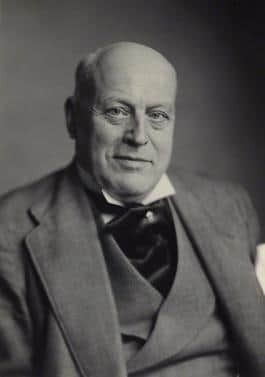

Labour also won Edinburgh Central, where retired printer Andrew Gilzean defeated Unionist Frank Watt, a lawyer who had been elected during the war in a 1941 by-election. Gilzean had served for 21 years on Edinburgh Town Council, where his focus was housing and slum clearance. He won with 54 per cent of the vote and a swing of 16.8 per cent from the Unionists.
And in Edinburgh North, traditionally a safe Unionist seat centred on the New Town, bookseller Eustace Willis, won the seat for Labour with a narrow 555 majority on a swing of 20 per cent.
He defeated the Unionist Sir Alexander Erskine-Hill who had had a 12,000-plus majority at the previous election in 1935.
Advertisement
Hide AdAdvertisement
Hide AdWillis would lose the seat at the following election in 1950, but four years later became MP for Edinburgh East and remained there till stepping down in 1970.
Edinburgh East already had a Labour tradition in 1945 and Frederick Pethick-Lawrence had been the MP since 1935. He had previously been an MP for Leicester, served in Ramsay MacDonald's 1929-31 Labour government and was also briefly leader of the opposition in 1942 while most senior Labour politicians were serving in the wartime coalition government.
But before entering parliament, he had been active in the campaign to secure women the right to vote and in 1912 served a nine-month prison sentence following the Suffragettes' window-smashing campaign, even though he disapproved of such tactics and was later expelled from the movement for that stance.
His Unionist opponent was Edinburgh University philosophy lecturer William Sinclair who had become famous for his series of wartime radio talks "Voice of the Nazi", which were an expose of German propaganda methods. These were judged so effective that Hitler's Joseph Goebbels had publicly vowed he would be killed and so he was allowed to carry a firearm as self protection.
Advertisement
Hide AdAdvertisement
Hide AdPethick-Lawrence won with a 6,529 majority. Soon afterwards he was appointed to the Cabinet as Secretary of State for India and Burma and weeks later was given a peerage, causing a by-election which Labour comfortably won.
Edinburgh West was one of the seats the Unionists held onto. Ian Clark Hutchison had been elected unchallenged as MP for the seat at a by-election in 1941 - the last uncontested by-election to take place in Scotland. But in 1945 Labour finished just 1,054 votes behind, compared with the 14,229 majority the Unionists had in 1935.
Clark Hutchison's father had been Unionist MP for North Midllothian and his younger brother Michael was later MP for Edinburgh South.
Described as "a Conservative of the deepest blue, unswervingly loyal to his party's cause" he had served in the navy before being elected to Edinburgh council in 1931, where he championed the cause of school meals for needy children.
Advertisement
Hide AdAdvertisement
Hide AdRecalled to the navy in the war, he became inspector of naval ordnance for Edinburgh and south-east Scotland.
Labour's candidate was socialist lawyer Gordon Stott, then an advocate-depute who often prosecuted in industrial accident cases. He was a pacifist and had been a conscientious objector during the war and much later he became Lord Advocate, Scotland's senior law officer, in Harold Wilson's Labour government of 1964 and then served as a High Court judge.
International as well as domestic issues featured prominently in the campaign.
Two days before the poll, Labour's Ernest Bevin, who had been a key figure in the coalition government and would become Foreign Secretary in the new Labour gtovernment, was in Leith stressing the need for the "three Great Powers - the United States, Soviet Russia and ourselves" to build confidence between themselves and act as "a police force to protect peace throughout the world".
Advertisement
Hide AdAdvertisement
Hide AdThe same day, Labour colleague Herbert Morrison - Peter Mandelson's grandfather - who had been Home Secretary in the coalition government, used a speech in Edinburgh to criticise Churchill's choice of the Earl of Rosebery as Scottish Secretary in his caretaker government.
"It is well established that the Secretary for Scotland should be drawn from the House of Commons because it is desirable he should be in daily touch with the elected representatives of the people," said Morriosn. "Perhaps Mr Churchill came to the conclusion that there was not a single Scottish Tory MP fit for the job."
On polling day, the weather in Edinburgh “cloudy and rather sultry” but dry. When the polls closed, all the ballot boxes were taken to the sheriff court where they were kept secure until the count two weeks later at Boroughmuir School in Viewforth.
After the results were announced, Leith's new MP James Hoy told reporters: "I won because people believed in the Labour Party's programme. Mr Churchill has been the great handicap to the Tory Party."
Advertisement
Hide AdAdvertisement
Hide AdRe-elected Unionist MP Clark Hutchison claimed: "Electors in West Edinburgh took a broad view of the position and saw the danger of changing horses when the Japanese war is still in progress."
But Edinburgh East victor Pethick-Lawrence said: "Labour was the only party to put forward a programme worthy of the times in which we live."
Ex-Lord Provost took on Trotsky’s former aide de camp for city seat
SIR William Darling, former Lord Provost and great uncle of Alistair Darling, became an MP for the first time when he was elected at the age of 60 for the safe Unionist seat of Edinburgh South with more than 70 per cent of the votes and a comfortable majority of 13,885.
Advertisement
Hide AdAdvertisement
Hide AdDescribed as “one of the best-known and forceful personalities in Scottish public life”, he took over from Sir Samuel Chapman who had been the Unionist MP for the seat for the previous 23 years.
As well as being Lord Provost, Sir William had also served as city treasurer, was proprietor of a well-known drapery store in Princes Street, owned two bookshops and was a director of the Royal Bank of Scotland.
He had seen much action in the First World War and been wounded five times. In the Second World War he was Chief Air Raid Warden for Edinburgh from 1939 to 1941.
His Labour opponent William Earsman, leader of the Labour group on the city council, claimed to have been the only Briton to have served in the Red Army, acting as aide de camp to Trotsky for 18 months. On leaving Russia he received a gold medal from Trotsky in appreciation of his services, but later became a severe critic of Soviet policy.
Advertisement
Hide AdAdvertisement
Hide AdEarsman had also been one of the founding members of the Communist Party of Australia and its first general secretary.
But he was refused re-entry to Australia after attending the Fourth Congress of the Comintern in Moscow in May 1922. He remained in the UK where he was placed under surveillance by MI5, but in 1950 was awarded an OBE for his work with the Edinburgh Festival.
He was said by The Scotsman to “present the Socialist case in well-reasoned and quietly stated terms”.
Darling was out of action for the closing stages of the campaign after suffering appendicitis and undergoing an operation, but he was well enough to attend the count. On his way out he told reporters: “I lost my appendix and gained a seat.”
Comment Guidelines
National World encourages reader discussion on our stories. User feedback, insights and back-and-forth exchanges add a rich layer of context to reporting. Please review our Community Guidelines before commenting.